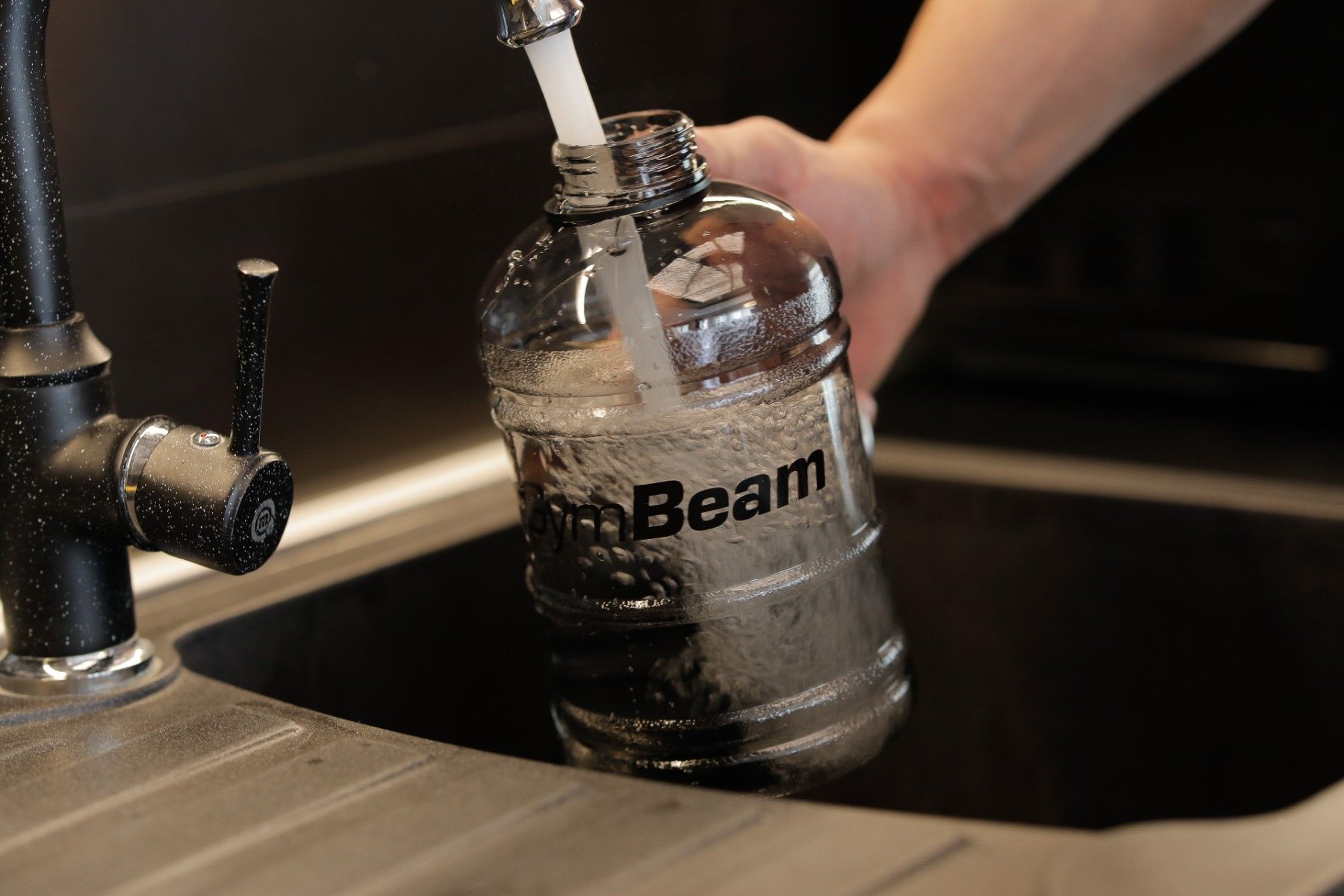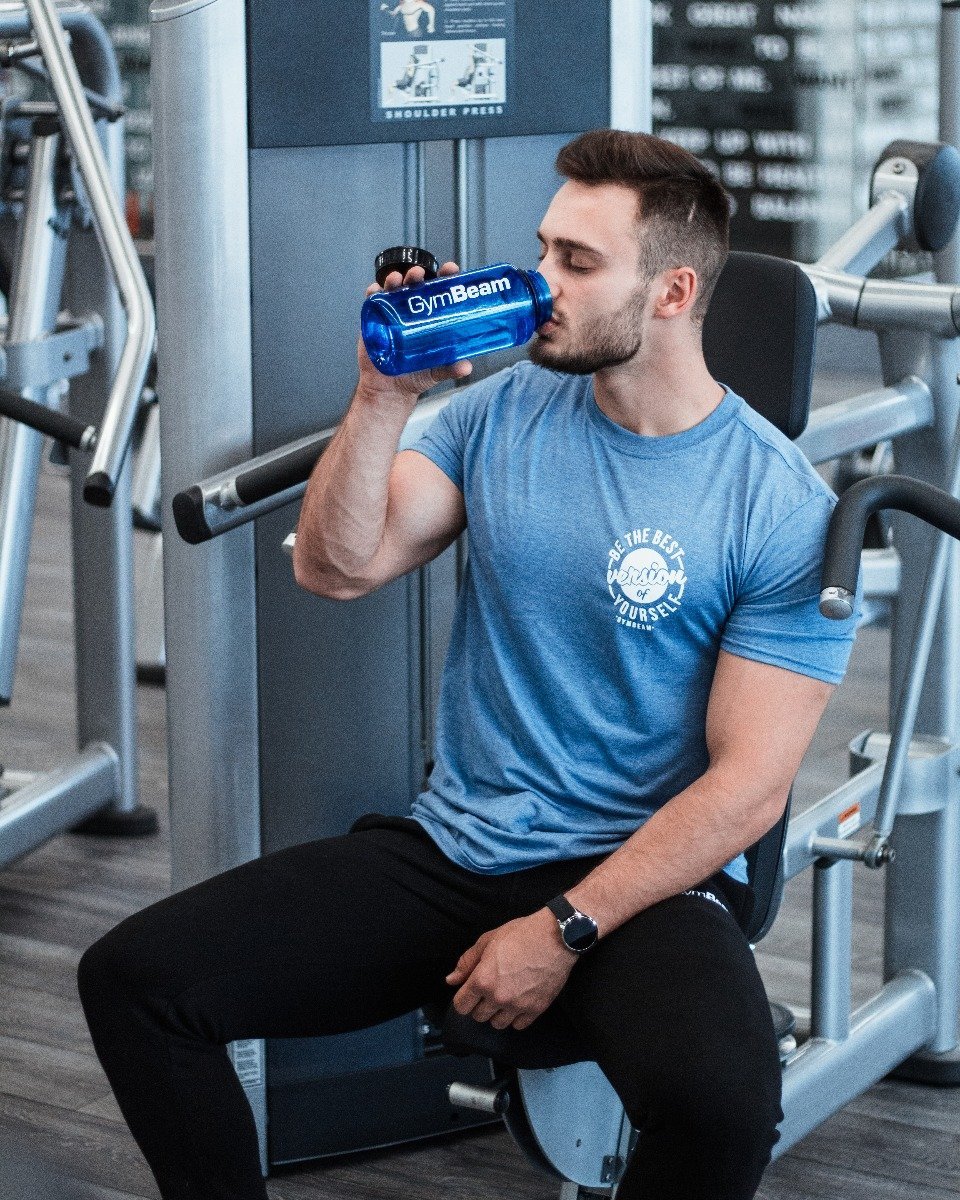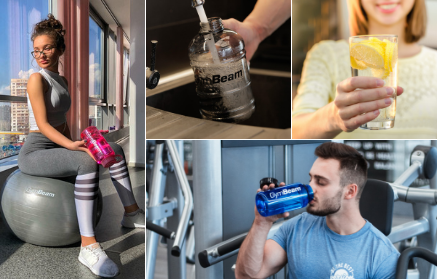Table of Contents
Metabolism and water. These two words are very frequently linked by the “specialists” on the internet and in the gym. Which one of the popular claims about water and metabolism is true? We looked at them in the article in which we will explain what metabolism is and how it works and by which means you can support it.
What is metabolism?
Metabolism is a process in which the human body transforms everything that we eat and drink into energy. During this complex biochemical process, calories in food and drinks are combined with oxygen in order to release energy which is needed for the right body functioning. [1]
Even in the time of rest, our body requires energy for providing the functions such as breathing, blood flow, maintaining of the hormone level, growth and regeneration of the cells. The number of calories which are used for performing of these basic functions is known as basal metabolism but it is often called metabolism. [1]

Basal metabolism is individual and influenced by factors such as [1]:
- the size and composition of the body – people who are bigger or have more muscles, burn more calories in the rest time
- gender – men usually have less body fat and more muscles than women and it means that they burn more calories
- age – with the age, the proportion of muscles is lowered and there is an increase of fat which slows down calorie burning
Energy production for the basic body functions is relatively stable and doesn’t change. The speed of basal metabolism is influenced by theother two factors which determine how much of calories your body burns every day. [1] [2]
- food processing (thermogenesis) – digestion and absorption, transport and storage of consumed food also burns energy. Approximately 10% of calories from carbohydrates and proteins which we had eaten are used during the digestion and absorption of the nutrients
- physical activity and exercising – any motion, training in the gym or walk with dog belongs to the additive calories which our body burns during the day. The motion and sport are the most variable factors which determine how much calories you burn during the day.
The activity which we perform during day doesn’t belong to exercising, the specialists call it NEAT (non-exercise activity thermogenesis). It is the basic motion such as walking at the workplace or work in the garden or walking few steps from flat to car. Through this activity we usually burn from 100 – 800 calories during the day. [1] [2]
You might be interested in these products:
Metabolism and weight
Majority of people have a tendency to blame metabolism for their weight. However, metabolism is a natural process which fixes many mechanisms in the body the way it satisfies the individual needs. Only in a few cases, there is overweight which is related to health problems and metabolism slow down. Cushing syndrome or insufficient thyroid activity, hypothyreosis, belong among them. [1]
Gaining of the weight is acomplicated process which is probably the combination of genetics, hormones, food composition, environmental impact and lifestyle including sleep, physical activity and stress. All the mentioned factors lead to unbalance in the following energy equation. You gain weight if you eat more calories than you burn. On the other hand, you reduce the weight if you burn more calories or when you receive less calories. This is the hidden rule of every “effective diet” or the way of eating. [1]
Even though it may seem that some people can lose weight more quickly and more simply than the others, everyone loses weight when burning more calories than receiving. If you try to lose weight, you should create caloric deficit by this, that you will eat less calories or you will increase the number of calories burnt by physical activity. The ideal solution is to combine both principles. [1] There are no other tricks not even these with lemon or cold water.

Metabolism and water
Water is the basic component of human health which the cells in the body need for maintenance of homeostasis, therefore normal inner environment for process of chemical reactions. There had been written a lot about the effects and benefits of water. Of course, hydration is important for body and we devoted time to this in the article Hydration before, during, after training and how to prevent dehydration but on the other hand, there is no need to assign miraculous effects to water.
If only drinking of water would bring results in the form of attractive slim body, there hadn’t been increase of the world curve of obese people so quickly. Let’s have a look on the most popular myths assigning to water in relation to metabolism.
Cold water and increase of metabolism
One small study of 2003 suggests that drinking of water can increase metabolism speed. After drinking of 500 ml of cold water, the metabolism is increased in 30% within men and women, while the effect was seen after 10 minutes of drinking water but the strongest effect was seen 30-40 minutes after consumption. This study works with thermogenic effects of water at which the temperature of water is deciding factor. The overall thermogenic response in this case was approximately 100 kJ. [4]

Before drinking litres of cold water, you should know that other studies didn’t confirm the mentioned effects of the previous research and brought the mixed conclusions which are needed to be examined more deeply. [5] [6] [7] This means that possible effect of the cold water for the metabolism speed is confirmed only by small study and there is need to do other researches. Despite that we recommend to hydrate body, do not rely that your metabolism will be started up only by water drinking.
Lemon water on an empty stomach
Do you know this popular dietologic myth that when you are having warm water with lemon on an empty stomach you will lose weight? Unfortunately, this claim doesn’t have any scientific support. It is only a myth that lemon water supports metabolism or balances pH in body as it was once believed. Despite that, lemon water is better for your body than sweet water. It helps to hydrate the body and also supplies you with the small amount of vitamin C. [6] [8] [9]
It is suitable as first morning drink not only because it helps with weight reduction but also because it hydrates you after 8 hours of sleep. Many people like it more than pure water and that belongs to the benefits of it. If you have a problem to give up sweet drinks in favour of water, try lemon water. By this, you will remove excessive calories out of your eating plan and at the same time, you will be hydrated which can help you to reduce weight.

How to increase metabolism?
You won’t be surprised that the answer is exercising. Increase of metabolic activity from the physical activity can be happening also after training. Excessive oxygen consumption after training can last more than one day in dependence upon the length and intensity of your physical activity. [2]
However, aerobic and anaerobic sports influence metabolism the other way. Aerobic activities have a tendency to burn more calories during exercising but less after exercising. On the other hand, anaerobic activities increase oxygen consumption mostly after training.[10] Besides that, anaerobic activities are better for muscle building which requires another dose of energy. After each training, the muscles are damaged and need energy in order to regenerate. [11]
Another method which supports metabolism is exposing to the cold. It is estimated that higher temperature of the nucleus increases the rest speed of metabolism at each Celsius degree in 10-13%. That is why some people search for spa in the ice, wear less layers of clothing or maintain the lower temperature in their homes. However, this method can be dangerous if it used the wrong way or tried by people with health problems. [2]
We have to mention the influence of food frequency on the metabolism. Unfortunately, there is no proof supporting the idea that more frequent consumption will increase the speed of metabolism. It is mostly about the overall number of calories which determines the changes in the body weight. [12] [13] [14] [15]

What to take out of it?
If you want to do something more for achieving your dream body and weight reduction, concentrate on the calories control which can be burnt by exercising. More active you are, the more calories you burn. The fact is that people about whom you would say that have more quick metabolism, are probably more active.
Regular aerobic activity such as walking, cycling or swimming is an excellent way to burn more calories. The ideal is to include at least 30 minutes of physical activity to your daily routine. If you want to lose weight or to fulfill the concrete fitness goals, you will have to have more time for physical activity. In this case, there is a need to include also power training.
The specialists recommend power training such as weight-lifting or strengthening at least twice a week. The power training is important because it has an impact against the muscle mass loss caused by ageing and also because the muscle tissue burns more calories than fat tissue. Gaining muscle mass is the key factor at the weight loss.
Health requires changes in your overall lifestyle. Every other motion will help you to burn additive calories. Try to move more, walk at the stairs, walk with dog or to vacuum more frequently at home.
You need to know that there are no miraculous tricks at the weight reduction. There is no simple way to lose weight. The base is physical activity and quality balanced food.
Dietary guidelines from 2015 recommend to lower calories amount in 500-700% kcal per day to reduce 0,5-0,7 kg per week. Add regular physical activity to it and your goal can be achieved more quickly. If you are already walking this way, food supplements such as fat burners can help you. [1] [16]
We wish you luck and believe that this article will help you to move closer to your fitness goals. Write down to the comments how you manage to fulfill your dreams and if you like the article, support it by sharing.
[1] Mayo Clinic - Metabolism and weight loss: How you burn calories – https://www.mayoclinic.org/healthy-lifestyle/weight-loss/in-depth/metabolism/art-20046508
[2] Kamal Patel - Is my “slow metabolism” stalling my weight loss? – https://examine.com/nutrition/is-my-slow-metabolism-stalling-my-weight-loss/
[3] Kamal Patel - Do I need to eat six times a day to keep my metabolism high? – https://examine.com/nutrition/do-i-need-to-eat-six-times-a-day-to-keep-my-metabolism-high/
[4] Boschmann M, Steiniger J, Hille U, Tank J, Adams F, Sharma AM, Klaus S, Luft FC, Jordan J - Water-induced thermogenesis. – https://www.ncbi.nlm.nih.gov/pubmed/14671205
[5] Jodi J. D. Stookey - Negative, Null and Beneficial Effects of Drinking Water on Energy Intake, Energy Expenditure, Fat Oxidation and Weight Change in Randomized Trials: A Qualitative Review – https://www.ncbi.nlm.nih.gov/pmc/articles/PMC4728633/
[6] Tracy Morris - The top 8 metabolism myths busted – https://blog.fitbit.com/the-top-7-metabolism-myths-busted/
[7] Robert Barrington - Does drinking water increase metabolic rate? – https://www.robertbarrington.net/does-drinking-water-increase-metabolic-rate/
[8] Nicola Brown - War lemon water - Healthy or hype? – https://www.fix.com/blog/benefits-of-warm-lemon-water/
[9] Kathleen Hou - Cam lemon water really help you lose weight? – https://www.forbes.com/sites/thecut/2015/11/05/can-lemon-water-really-help-you-lose-weight-2/#3fe033d27c1b
[10] Astrup A, Thorbek G, Lind J, Isaksson B - Prediction of 24-h energy expenditure and its components from physical characteristics and body composition in normal-weight humans. – https://www.ncbi.nlm.nih.gov/pubmed/2239751
[11] Phillips SM - The science of muscle hypertrophy: making dietary protein count. – https://www.ncbi.nlm.nih.gov/pubmed/21092368
[12] Leidy HJ, Campbell WW - The effect of eating frequency on appetite control and food intake: brief synopsis of controlled feeding studies. – https://www.ncbi.nlm.nih.gov/pubmed/21123467
[13] Palmer MA, Capra S? Bainess SK - Association between eating frequency, weight and health. – https://www.ncbi.nlm.nih.gov/pubmed/19566598
[14] Taylor MA, Garrow JS - Compared with nibbling, neither gorging nor a morning fast affect shot-term energy balance in obese patients in a chamber calorimeter. – https://www.ncbi.nlm.nih.gov/pubmed/11319656
[15] Bellisle F, McDevitt R, Prentice AM - Meal frequency and energy balance. – https://www.ncbi.nlm.nih.gov/pubmed/9155494
[16] U. S. News and world report - Best weight-loss diet – https://health.usnews.com/best-diet/best-weight-loss-diets


Add a comment